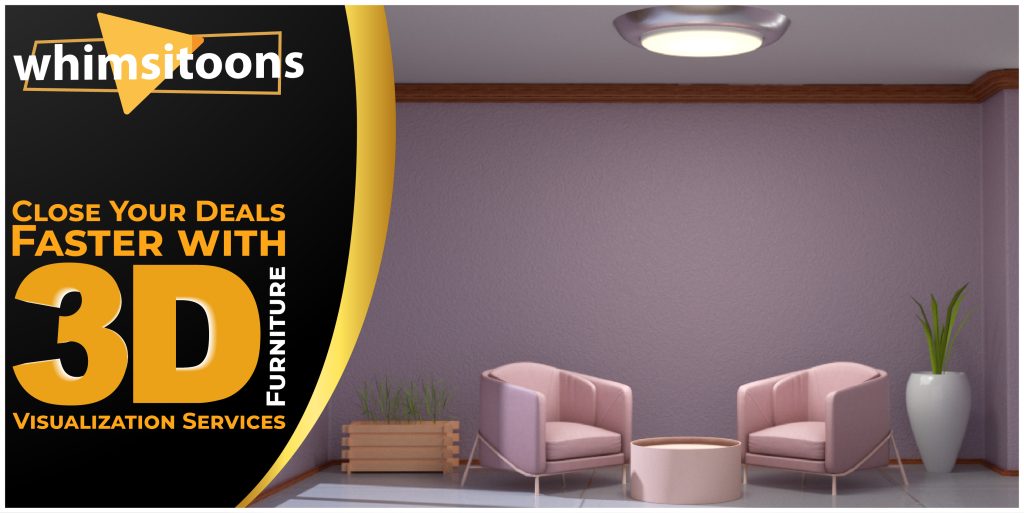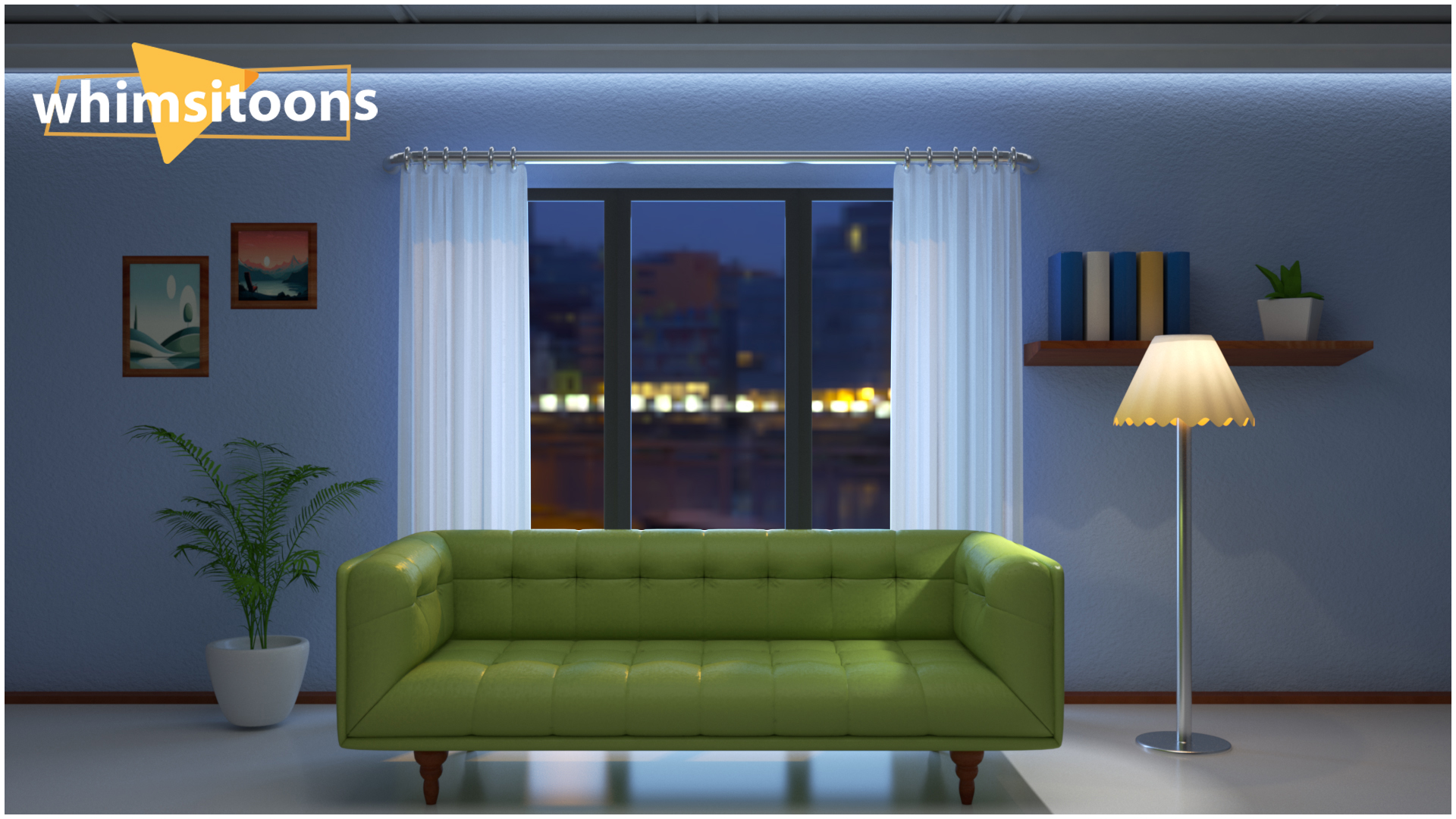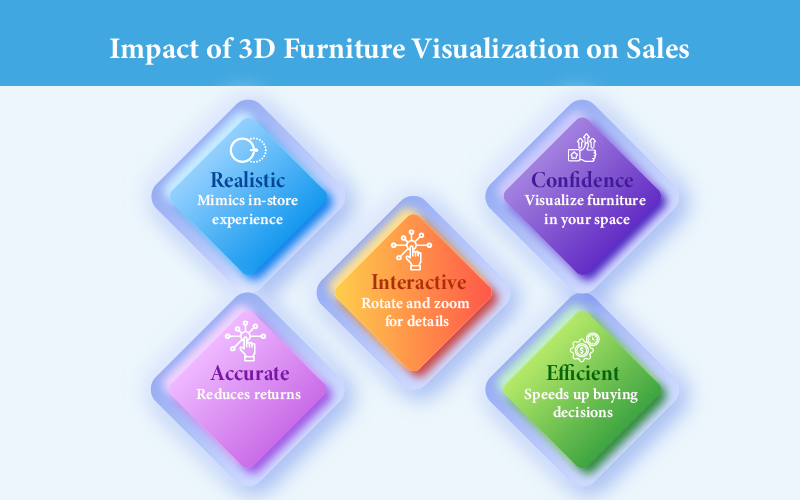Close Your Deals Faster with 3D Furniture Visualization Services

If you’re a furniture retailer or manufacturer looking for ways to boost sales, then getting 3D furniture visualization services for your business can be your best option.
3D furniture visualization empowers customers to visualize products in their spaces, which helps them make more confident purchases.
59% of furniture companies are increasing their use of 3D product visualization, according to a Forrester Consulting study, highlighting the significance of this technology in today’s business strategies.
Curious about how 3D visualization can change your sales strategy? Then keep reading this Whimsitoons blog till the end!
Why 3D Furniture Visualization is Key in the Sales Funnel
3D technology bridges the gap between in-store experiences and online shopping.
It allows customers to inspect products from every angle, mimicking a real-life shopping experience.
By incorporating 3D visualization, retailers can not only showcase their furniture but also reduce uncertainty, speeding up purchase decisions and boosting sales.
Types of 3D Visualization

Below, we’ve listed some types of 3D visualizations and explained how they can help furniture companies showcase their products properly.
-
3D animation
3D animation offers 3D interior visualization services to create animated sequences of furniture to show their appearance and functionality in motion.
Example:
Furniture companies can use this to create engaging product demo video animation for marketing and advertising campaigns.
-
360-Degree View
Companies can use a 360-degree view to give consumers the option to spin and examine furniture pieces from every perspective, providing them with an extensive visual representation of the article.
-
Example:
Furniture e-commerce websites use this to allow buyers to examine a product’s design, texture, and craftsmanship before purchasing.
-
Surface Modeling
Surface 3D furniture modeling accurately represents the material finishes and shapes of furniture, with a focus on exterior design and texture.
-
Example:
Furniture manufacturers can use surface modeling to showcase a variety of fabric textures, wood grains, or glossy finishes of their products.
-
Architectural Rendering
Display furniture pieces within a 3D furniture rendering services or conceptualized environment, such as homes or offices, to show how they complement a space.
-
Example:
Furniture retailers can inspire customers by creating visuals of their sofas, tables, or office desks styled in living rooms or workspaces.
Benefits of 3D Furniture Visualization for E-Commerce
As mentioned earlier, 3D furniture visualization services increase customer engagement, which leads to greater customer loyalty.
Here are the benefits in detail.
-
Improved Customer Experience
Customers can interact with 3D models by rotating, zooming, and viewing details like textures, colors, and finishes for a better understanding of the product.
-
Increased Confidence and Trust
By offering a clear and realistic view of the product, customers can make more informed decisions, reducing the chances of dissatisfaction and product returns.
-
Customization and Personalization
Offering customizable options within the 3D model adds a unique touch to the shopping journey and improves retention.
-
Reduced Decision Fatigue
When customers interact with lifelike 3D furniture visualization services, they gain clarity about size, texture, and functionality, simplifying the decision-making process.
This reduces hesitation and speeds up purchase decisions.
-
Time Saving
3D visualization allows businesses to showcase new furniture designs before physical products are available, accelerating the time to market and creating excitement among customers.
-
Higher Conversion Rates
Interactive 3D models can keep customers engaged longer on product pages, which can directly contribute to increased conversion rates.
-
Competitive Advantage
Offering 3D visualization sets your store apart from competitors who only rely on traditional images.

Implementation Strategies for E-Commerce Stores
-
Choosing the Right Technology Partner
Selecting a technology partner with expertise in 3D rendering and modeling is important for successful implementation.
Look for a partner who understands your product range, offers scalable solutions, and provides ongoing support.
Ensure they can deliver high-quality, realistic visualizations.
-
Integrating Visualization into the Shopping Journey
Integrate 3D visualizations into product pages, enabling customers to interact with furniture before purchase
Businesses can ask their 3D visualization company to include options for customization, like:
- Color or material changes
- Enable 360-degree views to enhance the shopping experience.
This can further allow customers to visualize how furniture will look in their homes.
-
Optimizing for Mobile and Desktop Platforms
Ensure that 3D visualizations are optimized for both mobile and desktop platforms.
This includes fast load times, touch-friendly navigation on mobile, and smooth performance on desktop.
The user experience should be consistent across devices, and responsive design should accommodate various screen sizes and resolutions.
-
Marketing the 3D Visualization Feature
Promote your 3D visualization feature through your website, social media, and email campaigns to inform customers of the enhanced shopping experience.
Use engaging content, such as tutorials, demos, or custom animated explainer videos, to show how the tool benefits the customer and drives sales.
Traditional Images vs. 3D Visualization
|
Feature |
Traditional Images |
3D Visualization |
|
Customer Interaction |
Static images with limited engagement |
Interactive models with rotation, zoom, and customization |
|
Realistic Representation |
Often lacks detail, color accuracy, or texture |
Hyper-realistic visuals showing true-to-life materials |
|
Impact on Decision-Making |
Low engagement, leads to uncertainty |
High engagement, builds confidence and faster decisions |
|
Customization Options |
Not possible |
Fully customizable (colors, materials, configurations) |
|
Return Rates |
Higher due to unmet expectations |
Lower due to accurate visual expectations |
How to Hire 3D Furniture Visualization Services Provider in US
If you’re considering hiring a 3D rendering services provider in US. Here’s how you can find the right partner.
-
Research and Shortlist Potential Providers
Look for 3D visualization companies that specialize in furniture and interior visualization.
Explore their websites, portfolios, and services. Don’t forget to check reviews and client testimonials.
-
Request Proposals
Provide detailed information about your project, including the number of furniture pieces, expected quality, required formats, and timelines.
You can also request that providers include how they will approach your project and which 3D visualization software they will use.
-
Schedule a Consultation
Schedule a meeting to explain your goals, target audience, and the purpose of the visualization (e.g., marketing, sales, catalogs).
Ensure the provider is responsive and understands your vision. Effective communication is crucial for smooth collaboration.
-
Review and Finalize the Contract
Ensure the contract covers all agreed-upon deliverables, timelines, and revisions.
Make sure the contract includes clauses about intellectual property rights for the final 3D models.
Conclusion
Integrating 3D visualization into your e-commerce platform can revolutionize the customer experience.
By enabling customers to make informed decisions confidently, you not only enhance loyalty but also increase conversions and stand out in a competitive market.
As furniture buying becomes more digital, getting 3D visualization services for your business is a smart investment that can boost your sales and drive customer loyalty.
FAQs
Q 1: What industries benefit the most from 3D furniture visualization services?
3D furniture visualization benefits furniture retailers, manufacturers, interior designers, e-commerce platforms, real estate developers, and architects by showcasing furnished spaces to potential buyers.
Q 2: What skills should I look for in a 3D furniture visualization service provider?
Look for providers skilled in 3D modeling, rendering, and animation software, such as Blender and 3ds Max. rnThey should also have experience creating photorealistic visuals and interactive 3D models and integrating these features into e-commerce platforms.rn
Q 3: Can 3D virtual furniture modeling help with sustainability efforts?
Yes, 3D virtual furniture modeling reduces the need for physical prototypes, minimizing waste and resource consumption. It also allows businesses to showcase new designs without producing physical samples, aligning with eco-friendly practices.rn
Q 4: How can I measure the ROI of implementing 3D visualization services?
Track metrics such as increased website engagement (e.g., time spent on product pages), reduced product returns, higher conversion rates, and customer satisfaction scores.rnComparing these before and after implementing 3D visualization can provide a clear measure of ROI.rnrn










